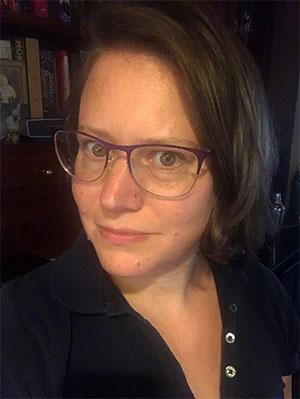Writing for Social Change in a Side-by-Side Course
By Mackenzie Dorsett ’20
August 12, 2020
 Elizabeth Kimball, PhD, designed a Community-Based Learning course to partner with UESF.
Elizabeth Kimball, PhD, designed a Community-Based Learning course to partner with UESF.
When Drexel University moved to an online setting for spring term, no one knew how successful the courses would be. This was especially true for nine Drexel students, one professor, and a handful of members of the nonprofit organization Utility Emergency Services Fund (or UESF, pronounced “you-sef”), who had set out to forge a new partnership. A Community-Based Learning course, Writing for Social Change (WRIT 315) was led by Professor Elizabeth Kimball, who connected the students with the professional staff of UESF.
UESF serves families and individuals, such as veterans and returning citizens, who are experiencing a crisis in their housing, often when utility arrearages lead to rental concerns and homelessness. UESF offers direct financial assistance and works with people to address the root causes of their utility and housing crises. The students in this side-by-side course, organized with the support of the Lindy Center for Civic Engagement, came from a variety of backgrounds: the sciences, the arts, and media and English. Although everyone had different skills to bring to the table, we shared a common goal: to write our way in to a partnership between Drexel University and UESF.
It was a new experience for everyone involved to figure out how to develop this relationship. With Dr. Kimball leading, the students and the UESF members decided to work on a “Theory of Change” that could be implemented to continue to develop the relationship for the next group of students who take this course. The Theory of Change is a roadmap for change that illustrates destinations of progress, identifies the routes to travel on the way to achieving progress, and interrogates assumptions about how the former leads to the latter.
In order to create a Theory of Change, the students and UESF members had to learn more about each other. First, UESF staff shared stories of their work life, and how they help the Philadelphia community. UESF was established in 1983 and focused exclusively on providing emergency utility assistance for 26 years. However, now they also help individuals with housing stabilization through financial aid and grants.
In addition, they lead workshops to work with their clients on budgeting and financial literacy in order to achieve stability in the short term, as well as to set personal and financial goals for the long term. Some of the Drexel students, who serve as Peer Readers in the Drexel Writing Center, led equity-centered writing workshops, which helped us all open up and learn to workshop professional documents like the UESF mission statement.
Eventually, we developed a few Theory of Change paths that we could take to continue this relationship in the future. In order to create these paths, we first had to come up with the outcomes we would like to see from the continued relationship between Drexel and UESF. There are three different kinds of outcomes: impact, influence, and leverage.
Impact revolves around the changes in people’s lives such as knowledge, skills, behavior, health, etc. Influence focuses on changes in institutions, community norms, partnerships, public will, business practices, or issue visibility. Leverage describes the changes in public or private funders’ investment strategies for community programs.
To develop the Theory of Change paths, we focused on the outcomes that we believed would be beneficial to continuing the relationship. Once we did that, we created “So-That” chains. Basically, a “So-That” chain helps clarify the connection between the different types of outcomes: impact, influence, and leverage.
Some of the ideas the group came up with through this exercise included: creating a co-op program in which students can work for UESF; making a second part to the class in which students could work directly on projects with UESF; and engaging the wider the Drexel community. By the end of the term, it became clear that future versions of the course would address systemic racism in housing practices, starting with the Drexel-UESF partnership and the organization itself.
The students of Drexel and staff of UESF built community with little shared background, or even a shared physical space. Getting students involved in nonprofit organizations like UESF is beneficial to actually making social change happen. Our own community building, we hope, will lead to a better, more equitable community for all Philadelphians.